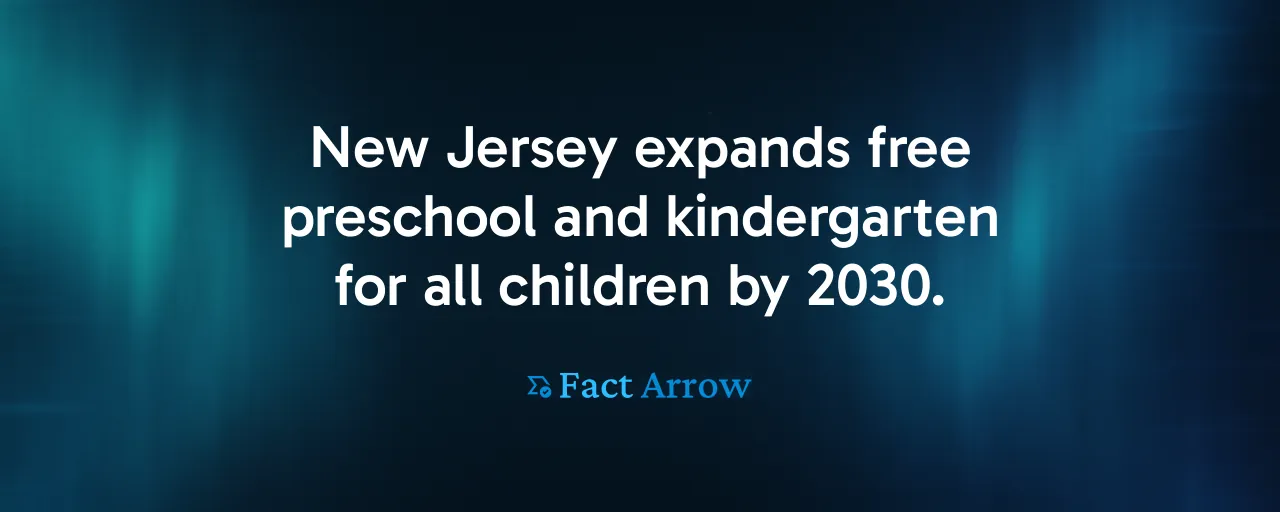A Landmark Step for New Jersey's Youngest
New Jersey has taken a bold leap toward a brighter future for its children. Governor Phil Murphy recently signed a trio of bills that cement the state's commitment to universal, tuition-free preschool and full-day kindergarten by 2030. This move, rooted in a vision of fairness, aims to give every child, regardless of their family's income or background, a strong start in life. The legislation builds on years of steady investment, with the state now spending $1.2 billion annually to expand preschool access across 229 districts.
These laws represent a significant promise to families, going beyond mere policy adjustments. By prioritizing early education, New Jersey is tackling one of the most stubborn challenges in public education: the opportunity gap that emerges before children even reach first grade. For working parents, especially those in low-income or multilingual households, access to free, high-quality preschool and kindergarten offers both practical relief and a pathway to long-term success for their kids.
The initiative resonates deeply in a state known for its diversity and economic contrasts. In communities like Plainfield, where families often juggle soaring childcare costs, the expansion of state-funded programs is a lifeline. It's a recognition that a child's potential shouldn't be limited by their zip code or their parents' paycheck.
Why Early Education Matters
Decades of research underline the transformative power of early education. Studies from Rutgers' National Institute for Early Education Research, conducted in New Jersey's own Abbott preschool program, show that children who attend high-quality preschool perform better in reading and math through eighth grade. These gains are especially pronounced for low-income students and those learning English as a second language, who often face barriers to academic success.
Beyond academics, preschool fosters social and emotional growth. Children learn to share, solve problems, and build confidence in structured settings. These skills lay a foundation for lifelong learning and resilience. The Center for American Progress estimates that every dollar invested in early education generates $4 to $9 in economic benefits, from reduced special education costs to higher lifetime earnings for graduates.
For families, the impact is immediate. Free preschool and full-day kindergarten ease the financial strain of childcare, which can rival college tuition. This support allows more parents, particularly mothers, to remain in the workforce, boosting household stability and contributing to the state's economy. In New Jersey, where childcare costs have surged, this relief is a game-changer.
Equity at the Core
The new legislation places fairness front and center. By codifying a needs-based funding formula, the state ensures that districts with fewer resources aren't left behind. This is critical in a state where property taxes often dictate school funding, creating stark disparities between wealthy suburbs and urban centers. The laws also streamline partnerships with community-based providers, ensuring that families in underserved areas have access to quality programs.
Inclusivity is another priority. The bills emphasize support for multilingual learners and children with disabilities, groups that have historically been underserved in early education. By requiring state agencies to publish clear information about preschool options, the legislation empowers parents to make informed choices, regardless of their language or familiarity with the system.
This focus on equity builds on New Jersey's legacy of tackling educational disparities. The Abbott v. Burke rulings of the 1990s mandated fair funding for high-poverty districts, and these new laws extend that commitment to the earliest years of learning. It's a proactive step to prevent achievement gaps before they start.
Strengthening Communities
The legislation's mixed-delivery approach is a nod to New Jersey's diverse needs. By partnering with public schools, private childcare centers, and nonprofit providers, the state creates a flexible system that meets families where they are. This collaboration expands access and supports local economies by sustaining jobs in the childcare sector.
Community providers, often small businesses run by women or people of color, gain stability through longer contracts and streamlined regulations. These changes allow them to focus on quality rather than bureaucracy. At the same time, the creation of a Universal Preschool Implementation Steering Committee ensures accountability, bringing together state agencies and lawmakers to monitor progress and address challenges.
For parents, the benefits extend beyond the classroom. Access to reliable childcare means more time to pursue careers or education, strengthening family finances and community resilience. In a state as dynamic as New Jersey, this investment in early education is an investment in social cohesion.
Looking Ahead
New Jersey's ambitious plan isn't without hurdles. Expanding preschool and kindergarten requires more teachers, better facilities, and robust oversight to maintain quality. The state estimates $250 million in annual costs over the next five years, plus $600 million for classroom upgrades. While the long-term savings are clear, from reduced remedial education to a stronger workforce, securing consistent funding will be critical.
Still, the state's track record offers reason for optimism. Since 2018, Governor Murphy's administration has nearly doubled preschool funding, adding thousands of seats. The new laws build on this momentum, setting clear timelines and accountability measures to keep the effort on track. By 2030, every child in New Jersey could have access to free, full-day kindergarten and preschool, a feat matched by few states.
This moment marks a turning point. By prioritizing the youngest learners, New Jersey is building a foundation for a fairer, stronger future. For families, educators, and communities, the message is clear: every child deserves a chance to thrive, and the state is stepping up to make it happen.
